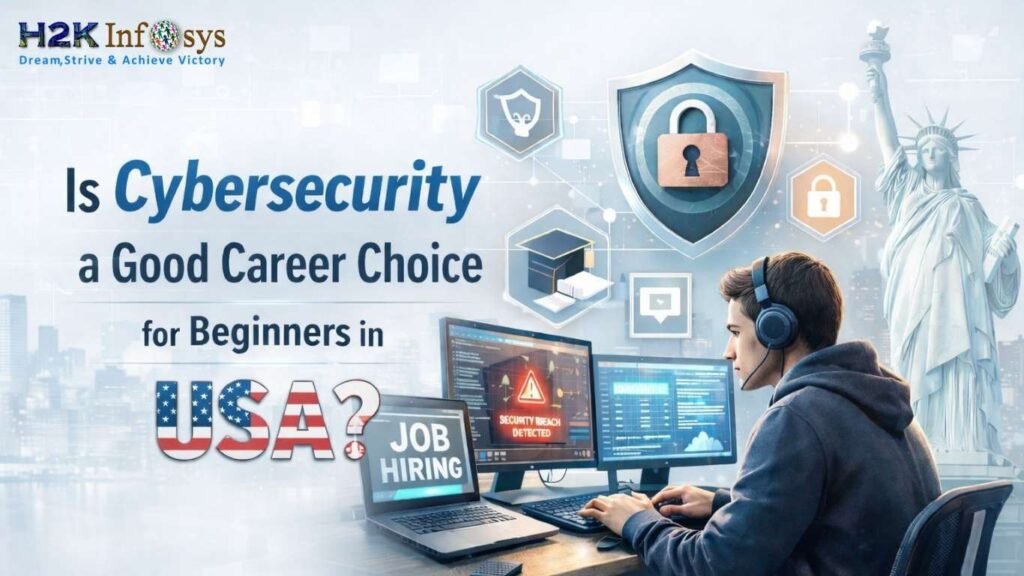Introduction
Cyber attacks grow every year, and organizations across all industries need professionals who can protect their systems, data, and networks. As the threat landscape expands, employers now prefer candidates who understand real-world challenges rather than only theory. This is why preparing for Cyber Security Interview Questions and Answers is essential if you plan to build a strong career in the field.
Companies look for trained professionals who can detect threats, secure cloud systems, respond to incidents, and perform risk assessments. Many learners today join Cyber security training and placement, Cybersecurity training and placement, or Cyber security course with placement programs to gain the confidence needed to succeed in interviews. If you are taking Online classes cyber security, Online training for cyber security, or Cyber security analyst training online, understanding interview expectations helps you stand out.
This comprehensive guide includes the most common Cyber Security Interview Questions and Answers, real-life examples, industry relevance, and simple explanations. It supports your journey whether you train through Online courses for cybersecurity, Cyber security training and job placement, or structured classroom programs near you.
Why Cyber Security Interviews Are Becoming More Practical
Hiring managers want people who can solve real problems, identify risks, and secure infrastructure during active threats. A recent industry study showed that the global cybersecurity workforce still lacks millions of trained professionals. This talent gap forces organizations to be selective and to design interviews that evaluate hands-on capability.
Candidates enrolled in Cyber security training courses, Cyber security courses with placement, and Cyber security training near me programs often perform better when they practice real-world scenarios. Employers want people who can:
- Read logs and detect unusual activities
- Secure networks and cloud environments
- Understand attack patterns
- Perform vulnerability analysis
- Follow structured incident response plans
Before moving into the full list of Cyber Security Interview Questions and Answers, remember that your interview success depends on how clearly you explain concepts using practical thinking.
Top Cyber Security Interview Questions and Answers for Career Success
Below is a complete list of the most commonly asked questions with simple, industry-ready explanations. These Cyber Security Interview Questions and Answers help you prepare for roles such as SOC Analyst, Security Engineer, Cyber Security Analyst, and more.
1. What is Cyber Security?
Cyber security protects systems, networks, devices, and data from unauthorized access or damage. It uses tools, processes, and best practices to keep information safe.
Example:
If a threat actor tries to steal data, cyber security tools like firewalls, IDS, and encryption prevent them from succeeding.
2. What is the difference between a vulnerability, threat, and risk?
- Vulnerability: A weakness in a system
- Threat: An event that can exploit the weakness
- Risk: The potential damage from the threat
This concept appears in many Cyber Security Interview Questions and Answers for beginners.
3. What is a Firewall?
A firewall monitors traffic entering or leaving a network. It blocks harmful traffic and allows safe communication.
Types include:
- Packet-filtering
- Stateful inspection
- Proxy
- Next-generation firewalls
4. What is IDS and IPS?
- IDS (Intrusion Detection System): Detects suspicious activity
- IPS (Intrusion Prevention System): Detects and blocks threats
Many Cyber Security Interview Questions and Answers include IDS and IPS because they are key components of network defense.
5. What is Encryption and Why Is It Important?
Encryption converts readable data into unreadable text to protect it during transmission or storage.
Two main types:
- Symmetric
- Asymmetric
Encryption appears often in Cyber Security Interview Questions and Answers for analyst-level roles.
6. What is Two-Factor Authentication (2FA)?
2FA adds a second step to password verification, such as:
- OTP
- Biometrics
- Authentication apps
It reduces the risk of unauthorized access.
7. What is a VPN?
A Virtual Private Network creates a secure, encrypted tunnel for data transmission. It protects remote users from attacks on public networks.
8. What is the CIA Triad?
CIA stands for:
- Confidentiality – Prevent unauthorized access
- Integrity – Prevent data modification
- Availability – Ensure services remain accessible
This question is included in almost all Cyber Security Interview Questions and Answers lists for beginners.
9. What is SQL Injection?
SQL Injection is an attack where harmful queries are inserted into a database through user input fields.
Example:
A login form with weak validation allows attackers to manipulate SQL queries.
This appears frequently in Cyber Security Interview Questions and Answers for application security roles.
10. What is Phishing?
Phishing is a social engineering attack that tricks people into sharing sensitive information. Attackers send fake emails that look trustworthy.
11. What is Penetration Testing?
Penetration testing is the authorized simulation of an attack to identify vulnerabilities.
Example:
A tester tries to break into a company’s system to fix weaknesses before hackers find them.
12. What is Hashing and How Is It Different From Encryption?
- Hashing is one-way and used for integrity
- Encryption is reversible and used for confidentiality
This comparison appears often in Cyber Security Interview Questions and Answers for data protection roles.
13. What is SOC?
A Security Operations Center monitors networks and systems for potential threats. SOC Analysts review logs, alerts, and incidents.
14. What is Incident Response?
Incident Response includes these stages:
- Preparation
- Detection
- Containment
- Eradication
- Recovery
- Lessons Learned
Incident response is a common topic in Cyber Security Interview Questions and Answers for entry-level candidates.
15. What is Ransomware?
Ransomware is malware that locks or encrypts data and demands payment. It has become one of the top threats worldwide.
Advanced Cyber Security Interview Questions and Answers
Mid-level interviews test your understanding of tools, infrastructure, and defense strategies. Below are advanced Cyber Security Interview Questions and Answers to help you prepare.
16. How Do You Secure a Web Application?
Key steps:
- Validate all input
- Use HTTPS
- Implement strong session management
- Update software regularly
- Perform vulnerability scanning
17. Which Tools Are Used for Vulnerability Assessment?
Common tools include:
- Nessus
- OpenVAS
- Nmap
- Burp Suite
- Qualys
These tools appear in many advanced Cyber Security Interview Questions and Answers for analyst and engineering roles.
18. What Is Zero Trust Security?
Zero Trust assumes no device or user is trusted automatically. Every access request must be verified.
Principles include:
- Least privilege
- Continuous monitoring
- Strong identity controls
19. What Is the Difference Between TCP and UDP?
TCP is reliable and connection-oriented.
UDP is fast but connectionless.
Network fundamentals appear in many Cyber Security Interview Questions and Answers across job roles.
20. What Are Brute Force and Dictionary Attacks?
- Brute force: Tries all possible combinations
- Dictionary attack: Uses a list of common passwords
21. What Is XSS (Cross-Site Scripting)?
XSS injects malicious scripts into webpages.
Types include:
- Stored
- Reflected
- DOM-based
XSS is a frequent topic in Cyber Security Interview Questions and Answers for application security jobs.
22. How Do You Secure Cloud Environments?
Key actions:
- Enable MFA
- Encrypt data
- Configure IAM roles
- Monitor activity logs
- Use network segmentation
23. What Is Port Scanning?
Port scanning identifies open ports on a machine. Attackers and defenders use it to discover vulnerabilities.
Port scanning is covered heavily in advanced Cyber Security Interview Questions and Answers because it is essential for assessments.
24. What Is Access Control?
Access control ensures only authorized users can access specific data or systems.
Types:
- RBAC
- DAC
- MAC
25. What Is Digital Forensics?
Digital forensics examines digital evidence after a cyber incident. Tasks include:
- Log analysis
- Recovery of deleted files
- Tracking attacker activities
Hands-On Tasks You May Receive in an Interview
Some Cyber Security Interview Questions and Answers include practical demonstrations, such as using command-line tools.
Example Task: Nmap Scan
nmap -sV -A 192.168.1.10
This scan detects open ports, running services, and system information.
Skills Recruiters Expect in Cyber Security Roles
Employers prefer candidates who complete Cyber security training and placement, Cyber security training courses, or Cyber security course and job placement because they gain skills like:
1. Log Analysis
Understanding SIEM tools and identifying unusual activities.
2. Network Traffic Monitoring
Using tools like Wireshark to inspect packets.
3. Vulnerability Assessment
Scanning systems and reporting weaknesses.
4. Threat Intelligence
Identifying attack patterns and sources.
5. Hands-On Practice
Building confidence through real labs is crucial for those preparing for Cyber Security Interview Questions and Answers.
Why H2K Infosys Helps You Succeed in Cyber Security Interviews
H2K Infosys provides training that focuses on both theory and hands-on skills. Learners receive guidance through:
- Live projects
- Instructor-led sessions
- Interview preparation
- Resume assistance
- Dedicated Cyber security training and placement support
Whether you choose Online classes cyber security, Cyber security analyst training online, or Online training for cyber security, H2K Infosys helps you grow faster.
Key Takeaways
- Cyber security roles demand strong fundamentals and hands-on skills.
- Preparing for Cyber Security Interview Questions and Answers improves your confidence.
- Recruiters expect knowledge of real tools, threats, and scenarios.
- Training programs with placement support help you stand out professionally.
Conclusion
Start your cybersecurity career with guidance from expert mentors and real-world training. Enroll in H2K Infosys today to gain hands-on skills through Cyber security training and placement and move closer to your next job opportunity.



























One Response
Absolutely loved reading this post! It gave me new ideas and inspired me to learn more about this topic. Thanks for spreading knowledge in such a simple way.